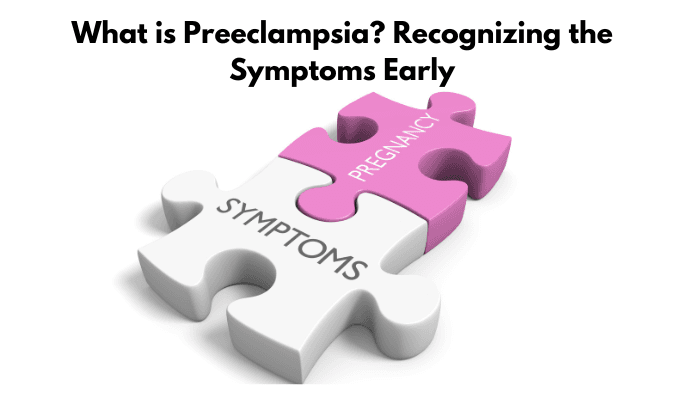Preeclampsia is a serious condition that usually begins after the 20th week of pregnancy. The exact cause of preeclampsia is unclear, but it is believed to involve abnormal blood vessel development in the placenta. The placenta supplies the baby with nutrients and oxygen from the mother’s blood. Normally, placental blood vessels develop to handle increased blood flow during pregnancy. However, these vessels don’t develop properly in preeclampsia, reducing blood flow to the placenta. This can lead to high blood pressure and organ damage in the mother, affecting organs like the liver and kidneys.
This condition is dangerous for both the mother and the baby, leading to severe health problems if not treated promptly. Dr. Pankhuri Gautam, a gynecologist in Jaipur, emphasizes the importance of medical intervention for preeclampsia. She is here to explain why recognizing the symptoms of preeclampsia early is crucial for ensuring a healthy pregnancy.
Potential Causes of Preeclampsia
Several factors can increase the risk of preeclampsia, including:
- – First pregnancies (because the body is experiencing change for the first time and blood vessels of the uterus are still adapting to the demand of blood flow to the placenta),
- – Family history of preeclampsia,
- – Multiple pregnancies (e.g., twins or triplets),
- – Obesity (BMI of 30 or higher),
- – Age (over 35 or under 20),
- – Preexisting conditions such as chronic hypertension, diabetes, kidney disease, or autoimmune disorders.
Early Symptoms of Preeclampsia
Early preeclampsia symptom recognition helps with timely intervention and management before it grows into something serious. Let’s find out the early symptoms for easy detection-
Early -Mild Preeclampsia Symptoms
- High blood pressure (hypertension): Normal blood pressure is usually around 120/80, where (120 is the higher number in BP reading, and 80 is the lower number) In preeclampsia if your blood pressure is consistently above 140/90, its means there is a potential risk to your health.
- Protein in the Urine (proteinuria): This can be detected with a simple urine test called a urinalysis. This dipstick test uses a strip that changes color to show protein levels. Normal protein levels during pregnancy range from 150 to 300 milligrams per day. During preeclampsia, they increase to more than 2000 milligrams per day. These high levels of protein in the urine indicate possible kidney damage.
- Swelling: Swelling in the feet, ankles, and legs, especially towards the end of the day, during pregnancy is normal and is called Edema. Swelling in the hand and face is a clear sign of preeclampsia. It is caused by abnormalities in the blood vessels that supply the placenta, leading to fluid leakage into the tissues.
Early – Severe Preeclampsia Symptoms
- Severe headaches: Normal headaches might come and go and can often be relieved with rest or pain relievers. Severe preeclampsia headaches don’t go away with normal headache medicine and can last for hours or even days.
- Vision changes: Blurry vision, sensitivity to light, or temporary vision loss can be signs of problems with the nerves in your eyes or brain. These are associated with blood pressure effects, fluid retention and swelling, neurological impact, and retinal detachment, which are also signs of preeclampsia.
- Upper abdominal pain: High blood pressure and abnormal blood vessel function compromise blood flow to the liver during preeclampsia. This leads to liver swelling and can sometimes even damage the liver cells, causing pain in the upper abdominal regions, where the liver is located.
- Nausea or vomiting: Nausea and vomiting during the first trimester of pregnancy are normal. They start around the 6th week and peak around the 9th week. However, nausea and vomiting during preeclampsia are often severe and can occur anytime in the second half of pregnancy (after 20 weeks). This is due to the body’s response to hypertension and other systemic effects of the disorder.
- Decreased urine output: Normal urine output during pregnancy is between 4 and 10 times. A noticeable reduction in urination below 500 mg can indicate kidney problems. If you notice urinating much less frequently or in smaller amounts than usual, it could be a sign of kidney issues further contributing to preeclampsia.
- Sudden weight gain: While some weight gain is normal during pregnancy, rapid and significant weight gain, over 2kg weekly, is a warning sign. It’s important to monitor weight gain closely and consult healthcare.
- Shortness of breath: If you experience sudden or severe shortness of breath, it might be due to fluid buildup in your lungs, a serious condition. Don’t ignore this preeclampsia symptom—seek medical help right away to ensure your safety and health.
Conclusion
Preeclampsia is a serious condition that severely affects both the baby’s and the mother’s health. For the baby, it can cause premature birth, impaired growth, stillbirth, infant death, and other associated lifelong challenges. Whereas, for the mother, it can lead to organ failure, permanent organ damage, clotting problems, and, in some severe cases, death.
Early detection of preeclampsia symptoms can help manage health conditions and save the lives of both the baby and the mother. If you’re at risk of developing preeclampsia or worried about it in your pregnancy, then you must consult Dr Pankhuri Gautam.
For more than five years, she has been treating dynamic issues. She is one of Jaipur’s best and most knowledgeable gynecologists. In addition to treatments, she offers emotional and mental support, which is much needed during pregnancy.
Connect with the expert now to know more!



